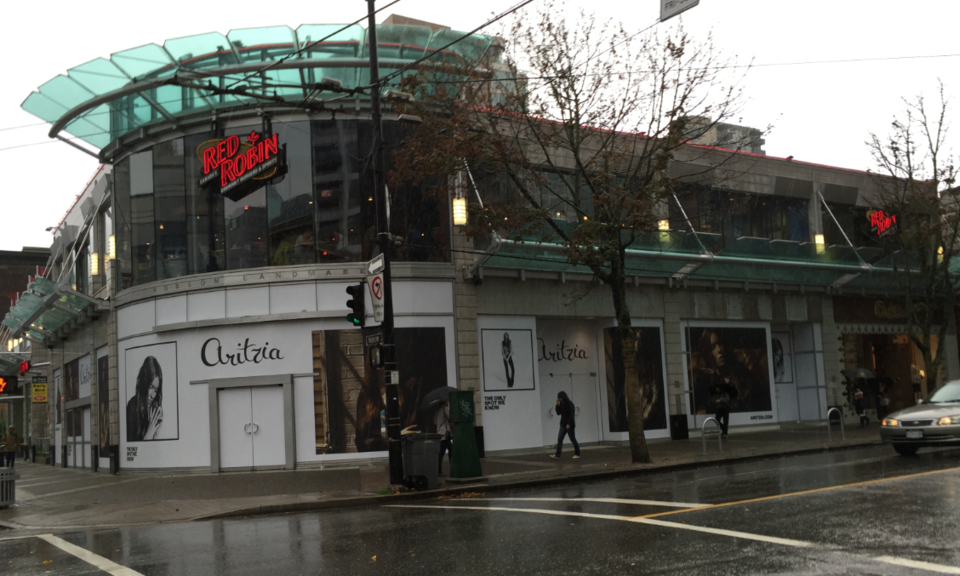The biggest local sign that Vancouver-based Aritzia has grand expansion plans is the renovation underway at the corner of Thurlow and Robson streets.
Once complete, the site will house a 13,027-square-foot flagship store that will be the largest store in Canada for the womenswear retailer.
Aritizia, which operates approximately 70 stores, opened its third Manhattan outlet in late September.
Each of the New York stores is about the same size as the one that the company plans to open on Robson Street early next year.
Between now and then, Aritizia plans to launch a handful of other new stores.
“Robson is still an important destination, and this is a very important store for us,” Aritzia owner Brian Hill told Business in Vancouver at a recent Retail West conference.
“We’re not opening on Robson Street out of nostalgia for how important Robson Street was for us in the early days.”
Hill, who founded Aritzia in 1984 with a store in Oakridge Centre, first opened the successful store on Robson Street in 1986. It was a 1,500-square-foot space at 1088 Robson Street, between Burrard and Thurlow streets, where J. Crew now operates.
Hill moved the store one block west to a larger 3,400-square-foot space, at 1110 Robson Street, in the late 1990s and then started expanding that store in both directions.
About eight years ago, he took space immediately east of his store; a year ago, he took space to the west.
His latest move is to take more space to the east – on the corner where Starbucks (Nasdaq:SBUX) operated a café for decades before closing in May 2012 after it could not agree to lease terms with the landlord.

“Depending on the market we open different-sized stores, and our stores, generally speaking, are getting bigger,” Hill said.
He believes that a seminal moment that helped propel Aritzia to its current success happened more than 10 years ago.
Hill was in an H&M store and saw a shirt that was similar in style to ones he carried and was made of the same fabric.
H&M was retailing the T-shirt for $9.99, which was several dollars less than Hill’s wholesale price.
“We really started honing in on our supply chain,” he said. “We could not compete selling the same thing as H&M, and I don’t think we do now.”
Hill created brands such as Wilfred and TNA, which became so popular that he soon opened stand-alone stores under those banners. The westernmost end of his current Robson agglomeration carries Wilfred signage, and Aritzia operates a TNA store on Robson Street between Burrard and Thurlow streets.
Hill opened a Wilfred store in Toronto’s Sherway Gardens earlier this month and plans to open another in Calgary’s Chinook Centre next month.
New Aritzia stores will open in Saskatoon on October 29, in Montreal in November and in February, 2016, in Boston.
“If you can develop a private-label brand within a store and it takes off, that’s gold,” retail analyst and Retail Insider Media Ltd. owner Craig Patterson said of Aritzia’s business model.
He explained that retailers make a much higher margin on private-label products because they cut out intermediaries and can sell their self-manufactured products at prices comparable with established brands.
The products also have a cachet because they are exclusive.
Aritzia does not reveal where its clothing is made or what percentage of its sales is from private-label products.
Other Canadian retailers such as Boys’Co, Shoes.com and Simons have also found success creating and then selling their own brands.
“Simons is the king of private-label sales in Canada,” Patterson said. “About 80% of their sales is for private-label products. I think they have a greater share of those sales than anyone else.”•




